Steamgothic
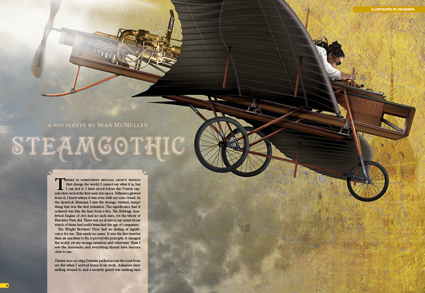 Steampunk is a literary subgenre that has also sprouted a lifestyle that encompasses fashion, music, and art based loosely on a philosophy of hands-on, do-it-yourselfness in an age of touchscreen virtual experience. To my knowledge, Sean McMullen’s “Steamgothic” is the first steampunk story that is also about the sensibility of the steampunk community. The narrator is an expert restorer of steam engines whose day job is to customize ultralight aircraft motors. He’s approached by a couple who have possession of an 1852 Aeronaute, a steam-powered aircraft which, had it actually flown, would predate the Wright Brothers by a half-century. He’s invited to participate in a restoration with the intent of proving this possibility. The initiative becomes the subject of a reality TV show called The Aeronauteers, and plenty of drama ensues, much of it more human than mechanically-related, with hidden motivations gradually revealed beyond postulating how if the Aeronaute had actually flown, would history have changed?
Steampunk is a literary subgenre that has also sprouted a lifestyle that encompasses fashion, music, and art based loosely on a philosophy of hands-on, do-it-yourselfness in an age of touchscreen virtual experience. To my knowledge, Sean McMullen’s “Steamgothic” is the first steampunk story that is also about the sensibility of the steampunk community. The narrator is an expert restorer of steam engines whose day job is to customize ultralight aircraft motors. He’s approached by a couple who have possession of an 1852 Aeronaute, a steam-powered aircraft which, had it actually flown, would predate the Wright Brothers by a half-century. He’s invited to participate in a restoration with the intent of proving this possibility. The initiative becomes the subject of a reality TV show called The Aeronauteers, and plenty of drama ensues, much of it more human than mechanically-related, with hidden motivations gradually revealed beyond postulating how if the Aeronaute had actually flown, would history have changed?
Recommended reading, even if you have only a slight interest in how the cogs actually turn. You can find it in the current Interzone.
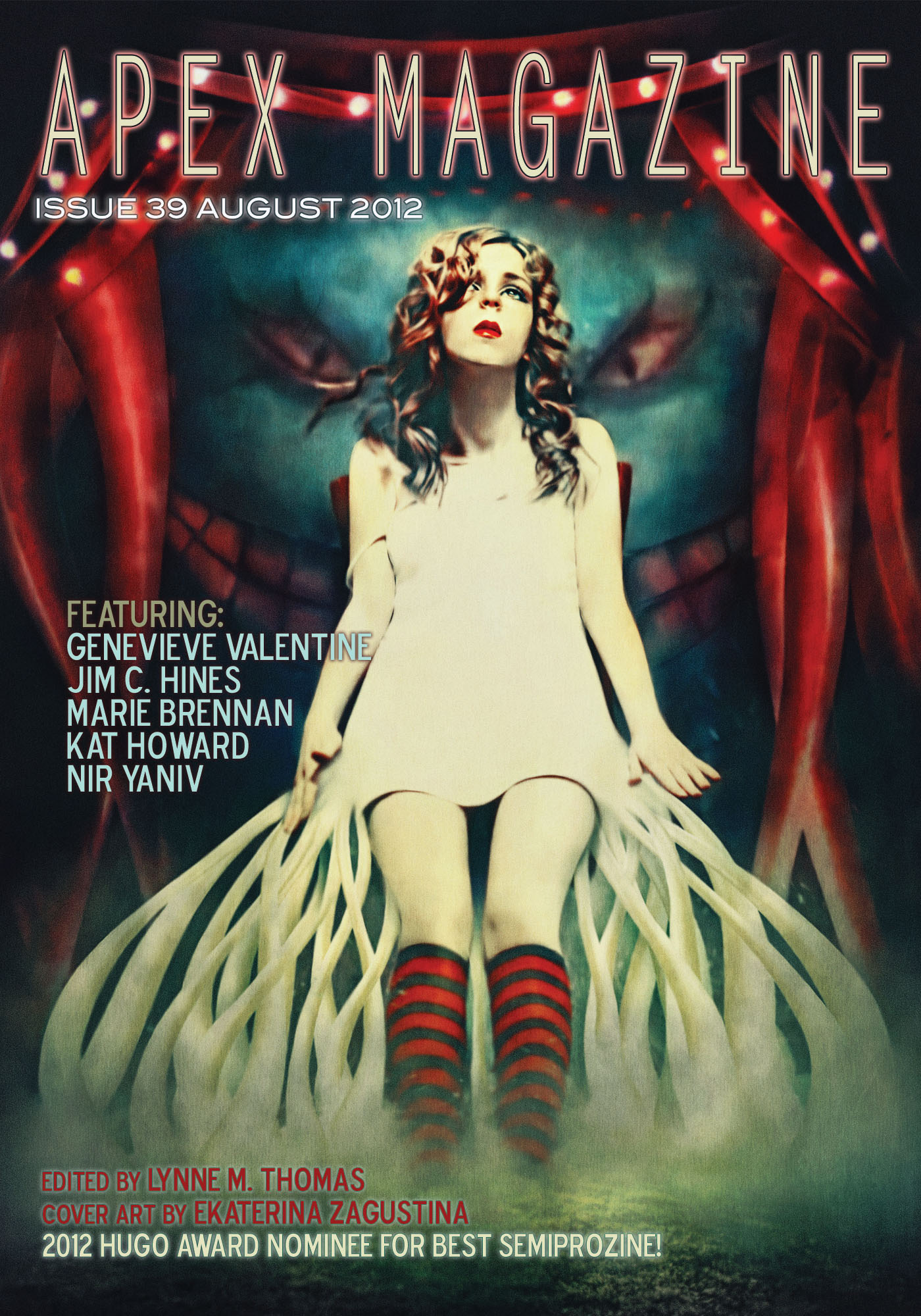 August’s Apex Magazine features
August’s Apex Magazine features  The July-August issue of Interzone features new stories by Sean McMullen (”Steamgothic”), Aliette de Bodard (”Ship’s Brother”), David Ira Cleary (”One Day in Time City”), Gareth L. Powell (“Railroad Angel”), and the 2011 James White Award-winning story “Invocation of the Lurker” by C.J. Paget; cover artwork by Ben Baldwin; an interview with Juliet E. Mckenna by Elaine Gallagher; “Ansible Link” genre news and miscellanea by David Langford; “Mutant Popcorn” film reviews by Nick Lowe; “Laser Fodder” DVD/Blu-Ray reviews by Tony Lee; and book reviews by various contributors.
The July-August issue of Interzone features new stories by Sean McMullen (”Steamgothic”), Aliette de Bodard (”Ship’s Brother”), David Ira Cleary (”One Day in Time City”), Gareth L. Powell (“Railroad Angel”), and the 2011 James White Award-winning story “Invocation of the Lurker” by C.J. Paget; cover artwork by Ben Baldwin; an interview with Juliet E. Mckenna by Elaine Gallagher; “Ansible Link” genre news and miscellanea by David Langford; “Mutant Popcorn” film reviews by Nick Lowe; “Laser Fodder” DVD/Blu-Ray reviews by Tony Lee; and book reviews by various contributors.

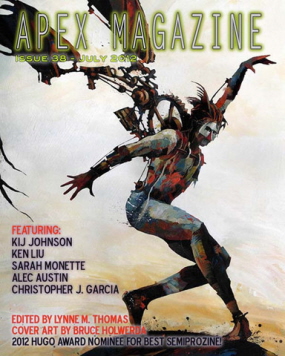
 I recently reviewed
I recently reviewed 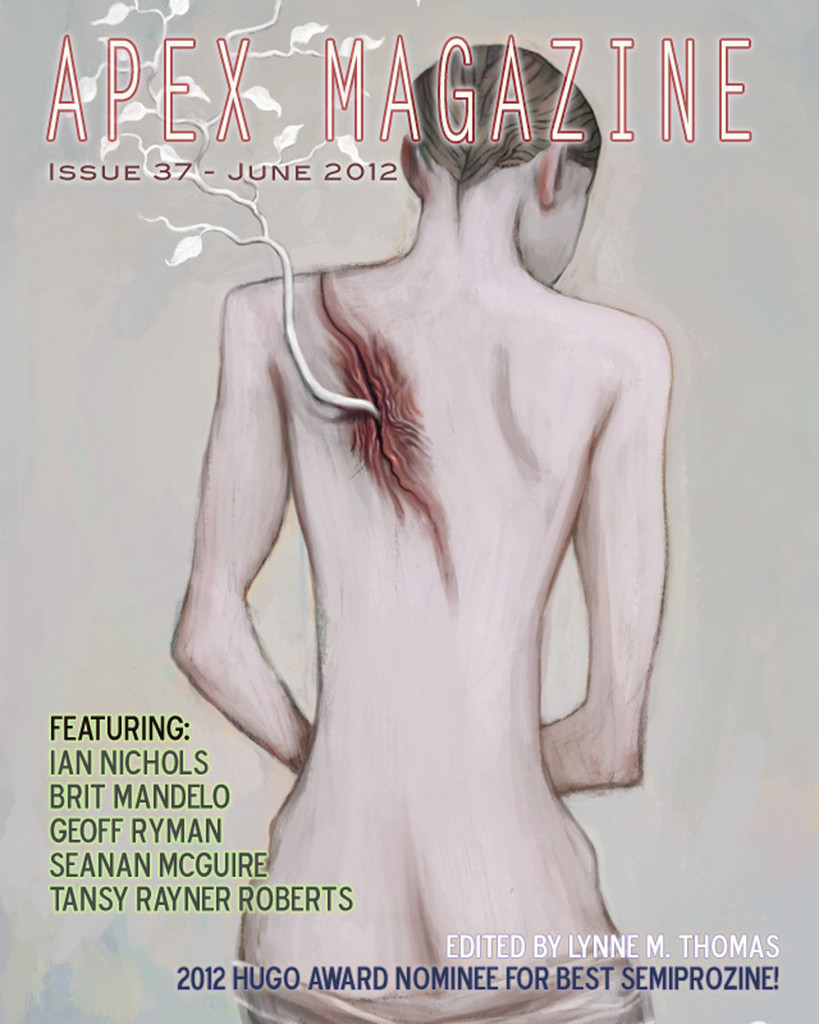 June’s Apex Magazine features ”Winter Scheming” by Brit Mandelo, “In the Dark” by Ian Nichols and “Blocked by Geoff Ryman (who is interviewed by Maggie Slater), as well as Seanan McGuire’s poem, “Wounds.” Ken Wong provides the cover art. Nonfiction by Tansy Rayner Roberts and editor Lynne M. Thomas round out the issue.
June’s Apex Magazine features ”Winter Scheming” by Brit Mandelo, “In the Dark” by Ian Nichols and “Blocked by Geoff Ryman (who is interviewed by Maggie Slater), as well as Seanan McGuire’s poem, “Wounds.” Ken Wong provides the cover art. Nonfiction by Tansy Rayner Roberts and editor Lynne M. Thomas round out the issue.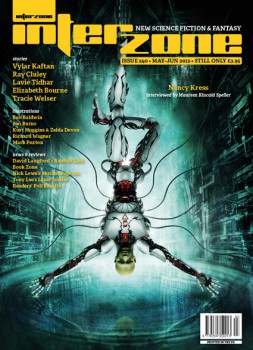 A version for the Nook will also be available in the near future. Twelve issue (one year) subscription can be ordered at Apex and Weightless for $19.95;
A version for the Nook will also be available in the near future. Twelve issue (one year) subscription can be ordered at Apex and Weightless for $19.95; 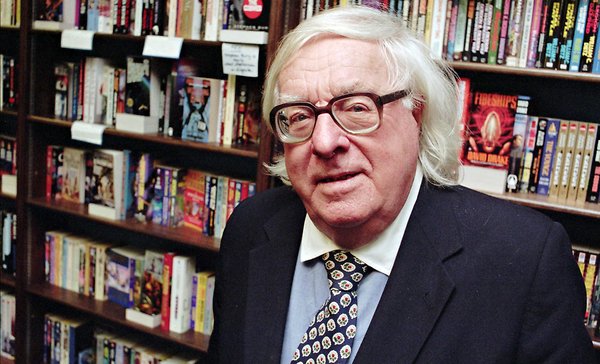
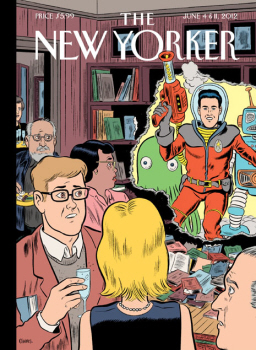
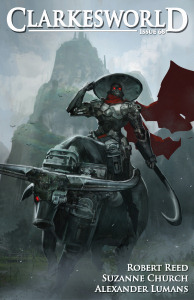 The May issue of Clarkesworld is currently
The May issue of Clarkesworld is currently 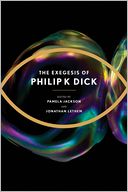 ramblings. While I tend to think all this stuff really is the result of a bad acid trip, Critchley as a professor of philosophy for the most part keeps a straight face. Some of you may laugh out loud not only at the source material, but the attempt at exegesis.
ramblings. While I tend to think all this stuff really is the result of a bad acid trip, Critchley as a professor of philosophy for the most part keeps a straight face. Some of you may laugh out loud not only at the source material, but the attempt at exegesis.